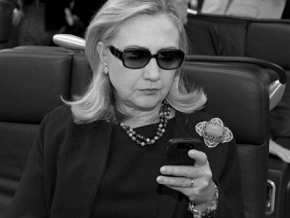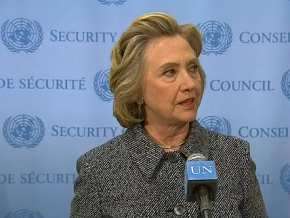Hillary Clinton Keeps Making Untrue Claims About Her Use of a Private Email Server
The Democratic frontrunner's untruthful responses to the private email scandal prove she can't be trusted.

The most important thing to understand about the continuing scandal over Hillary Clinton's exclusive use of a private email server while serving as the Secretary of State is that almost everything she has claimed about the matter has turned out to be not true.
After questions arose about the unusual arrangement, which was in violation of State Department rules requiring employees to use only official government email accounts for both security and records retention purposes, Clinton held a press conference in March to address the matter. During the conference, she claimed, among other things, that there was no classified information on the account.
"I did not email any classified material to anyone on my email. There is no classified material. I'm certainly well aware of the classification requirements and did not send classified material," she said.
The statement was clear and unequivocal. It was also not true.
When the inspector general (IG) for U.S. intelligence agencies reviewed just a small sample of the emails produced from her server—forty out of tens of thousands—the IG found that four were, in fact, classified.
Yesterday night it was revealed that two of those emails were classified Top Secret.
Given that 10 percent of the emails in the small batch examined by the IG were classified, it's more than likely that there are many, many more of the communications on that server are classified too. Clinton claimed that "there is no classified material," but what we know is that there's definitely some, and almost certainly quite a lot of it.
Since her initial statement in March, Clinton's campaign has updated her story. Her claim is now that none of the emails were classified at the time they were sent. "She followed appropriate practices in dealing with classified materials," campaign spokesperson Nick Merrill told Politico in July. "Any released emails deemed classified by the administration have been done so after the fact, and not at the time they were transmitted."
A joint statement in July from IGs at the State Department and the Director of National Intelligence indicates otherwise.
"[The four classified] emails were not retroactively classified by the State Department," the statement says. "Rather these emails contained classified information when they were generated and, according to IC classification officials, that information remains classified today. This classified information should never have been transmitted via an unclassified personal system." [Emphasis added.]
The Democratic presidential candidate agreed yesterday to turn over the server on which the emails were stored, as well as a thumb drive held by her lawyer containing copies of the emails, over to federal authorities. The handoff is itself a kind of turnabout for Clinton, who said in March that she would not provide access to the server.

It's not clear that much will come of it, given that the server is said to have been wiped clean after Clinton handed over paper copies of emails from the server—emails culled and selected by Clinton loyalists—to the Department of State. More, perhaps, will come from the growing investigation by the State Department IG into how communications "hardware and software" were used by senior State Department officials during Clinton's time there. But much remains unclear about that investigation, including as a McClatchy report notes, "exactly who and what is being investigated." Investigators appear to be looking into behavior by Clinton's top aides, but not Clinton herself.
The important takeaway from this story so far, however, comes not from any particular findings or conclusions of the investigations, but from Clinton's pattern of dissembling, untruthful responses.
In addition to falsely stating that there was "no classified information" on her email server, Clinton has also claimed that "vast majority" of her work emails went to government employees and email accounts and were thus "captured and preserved immediately" on the State Department's records system—even though the State Department's auto-archive system didn't work until February of this year.
Clinton also claimed in March that she carried just one phone for "convenience," but weeks earlier said she carries two phones, as well as two iPads, describing herself not as a convenience-minded traveler but as "like two steps short of a hoarder."
Asked by a reporter about the firing of a State Department ambassador for his email use, she pushed back on the idea that he'd been let go for relying on a personal email account; a report on the firing describes his "nonuse of commercial email for official government business" as a factor.
Clinton initially refused to let an independent examiner have access to her email server, saying it contained personal communications between Clinton and her husband, former President Bill Clinton. Yet Bill Clinton has, by his own account, sent just two emails in his life.
She declared that by turning over paper copies of emails from her server she'd gone "above and beyond" what was required, saying she "had no obligation to do any of that." This was not true either; she did have an obligation to hand over those emails.
She objected to a CNN reporter's assertion that she'd received a subpoena regarding her emails, saying "I've never had a subpoena." You can see the complete subpoena right here.
What Hillary Clinton has proven with her responses to the many legitimate questions raised by this story is that when called to account for unusual and unauthorized actions in her capacity as a senior public official, she responds with misleading statements, distortions, convenient excuses, and a general sense of irritation and entitlement—anything, in other words, but the clear and unambiguous truth. Which is to say that she has proven that not only that she is willing to secretly engage in risky, unauthorized, and decidedly non-transparent behavior as a public official, but that she cannot be trusted to honestly explain herself when she is caught.


Show Comments (322)